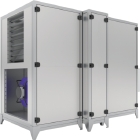Airflow introduces MVHR commercial units

Airflow Developments’ Duplexvent Rotary range is described as representing a significant advance in the compact construction of a high-performance MVHR (mechanical ventilation with heat recovery) system. A rotary thermal wheel can achieve up to 85% heat recovery. Air volumes are from 8000 to 16 000 m3/h, and all units comply with the latest ErP regulations.
Available in rooftop or indoor versions and suitable for commercial or industrial applications, these units are delivered in three parts. Units can be customised with a choice of duct orientations, with supply and extract ports offering up to 90° of rotation to enable connections to be installed to suit the building’s size and layout.
The specific fan power is from 0.45 W/m3h, depending on flow, through the use of electronically commutated fans. The double-skin construction incorporates 45 mm of high-performance mineral wool with thermal bridging to class T2 and a heat-bridge factor of TB2, so that overall heat loss is 0.037 W/m2K.
The thermal wheel is protected against transferring contaminants from the exhaust air to the incoming air.
Options include mixing damper, integrated heating or cooling coils and purge chambers. Units have full BMS and Internet connectivity.








